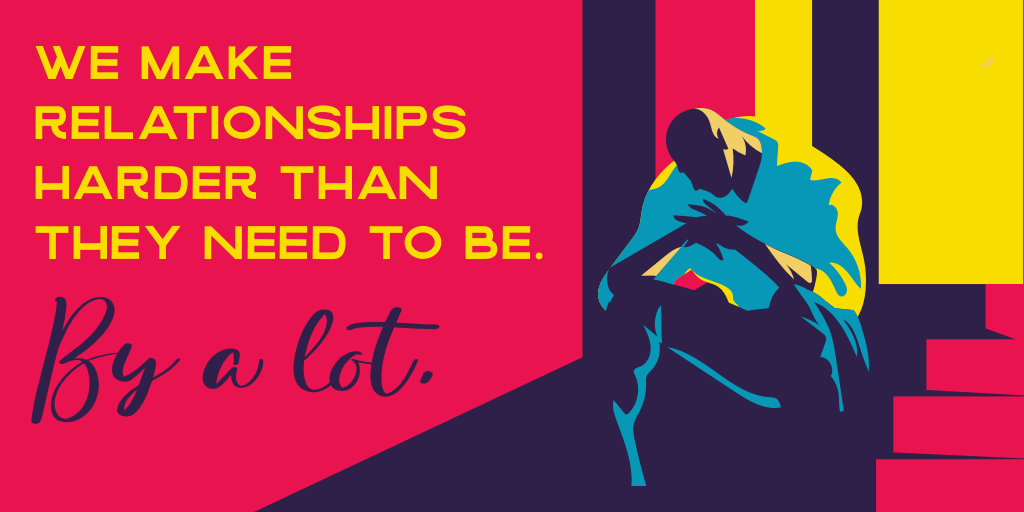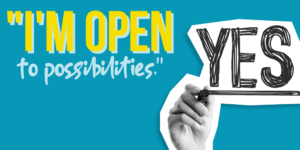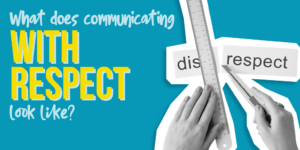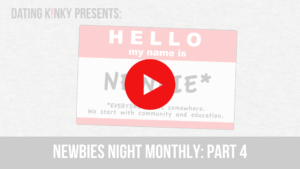I get it.
I really do.
I, too, used to be baffled by relationships and how to live the life I imagined in my head—happily and without conflict.
I read books. I bought journals and workbooks. I shared them with my partner. I even got those HAVE GREAT SEX ideas books with tear-out surprise ideas to bring back intimacy.
I made it hard for myself.
And, honestly, I made it hard for my partner.
MUCH harder than it needed to be.
And he had plenty of his own hard inside his head.
I like to share this venn diagram that I created about the sweet spot in relationships.
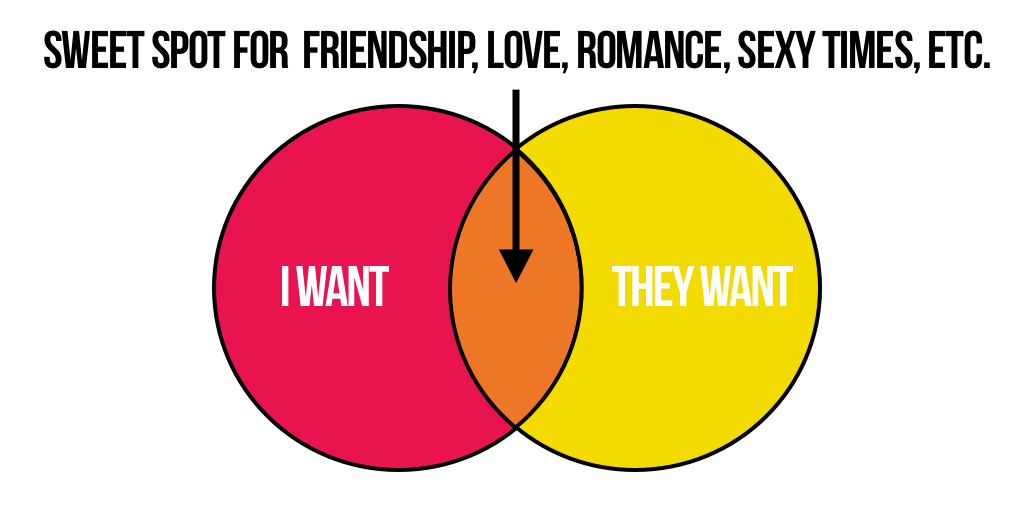
I feel there is also one for ick in relationships:
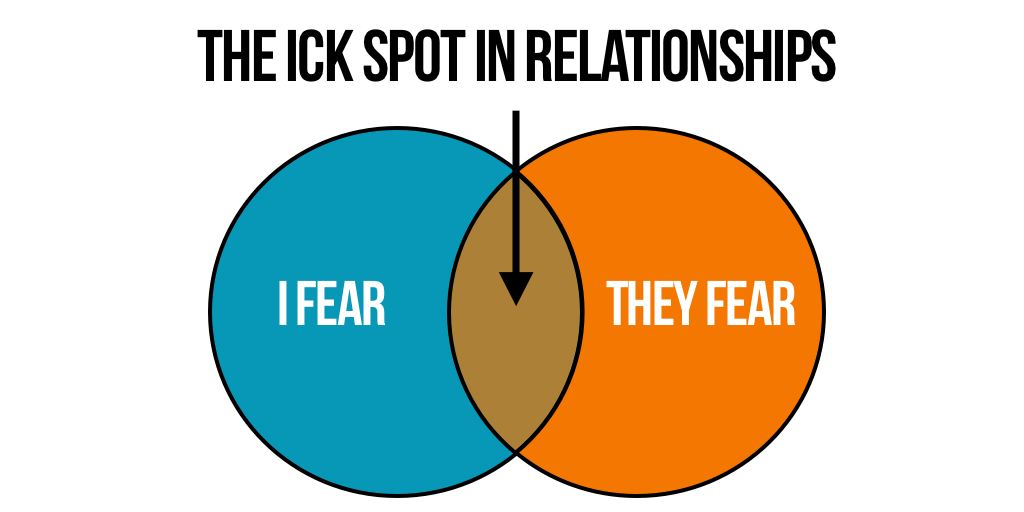
Where our fears bump up against and overlap the fears of our partners, and we create nastiness.
And just like reveling in the sweet spots of our relationships makes things wonderful and delicious, spending time in the ick spots makes us both lesser people, and brings us even more fear, loathing, resentment, anger and more.
The not-good stuff.
And we do this in major and minor ways.
This is the beginning of a series all about how we make relationships hard on ourselves, beyond the difficulty of just LIVING LIFE.
How we allow the things we can choose and control to get away from us, or even to sabotage us on top of how what is always out of control does.
And speaking of control, that’s the topic for today:
We make relationships hard by trying to control them (and other people).
It’s clear when you pause to think about it, and yet, this behavior is modeled so pervasively in our culture, it’s seems not only as the norm, but as desirable.
- The manipulative partner who is just trying to get their significant other to do something “for their own good.”
- The nagging partner who just wants the trash taken out.
- The person who obsesses of actions taken or not taken and compares them against a list of “how relationships look.”
- The constant stream of teasing or “negging” from one partner to another, cutting them down in front of friends and family, and pointing out their failings.
The kind of control that exists outside of kink and BDSM and consensual relationship negotiations.
Ewww. No, thank you.
And yet, it’s expected of us. Almost forced onto us.
“Why do you let _ do [that thing]?” “Oh, is just like that. So . That’s why I’m always after them to .”
“If you really loved me, you’d _.”
And it’s so simple to fall into the trap of trying to control our partners to create that relationship we see in our head.
“I get up early, and I’m a productive, happy, healthy person. They should go to bed early and get up early, too.”
(Because there is no such thing as a night owl, and if there was, it still wouldn’t be best for OUR relationship to be on separate schedules.)
“If they really cared about me, they would care how they dress and look when we go out in public together.”
(Because they MUST know that how they looks reflects on me, and the fact that they say they love me in anything and don’t worry about how I dress is just an excuse for not putting in effort.)
“They said they would take out the garbage and forgot. I got upset with them, so they never forget again.”
(Because I’ve NEVER forgotten anything, and yelling solves everything.)
Now, none of these may be YOUR control buttons. After all, what we try to control in our partners is often incredibly specific and unique to us.
However, MOST people have these types of controlling behaviors, AND hundreds of them for every type of relationship, because that’s how we were taught and socialized.
But what if we didn’t control others.
What if we didn’t even WANT to take any control from them that they did not happily and specifically give us?
I’m an early bird. I LOVE getting up early. My partner loves being up late.
I don’t try to change him. If he wants to change, he can. Otherwise, I accept that that is who he is.
AND MORE, in accepting that, I don’t then try to blame everything related to sleep, being on time, and so on on the fact that we have different schedules.
^^^^ That is pretty key.
Let’s look at another.
I’ve been on both sides of the clothing/style thing. I taught fashion design and personal style classes for years. My husband loved to wear t-shirts until they literally fell off his body in rags.
I was disgusted and humiliated.
Now, I love my partner, regardless of what he wears (as long as it doesn’t get us kicked out, LOL!). And he is the one who asks me sometimes to dress up for him (and I love to be asked and to do so), because I work from home, live in a more casual city, and I’m 100% comfortable with who I am now (I wasn’t back then).
And finally, the chores.
Because if it’s not the trash, it’s something we find to argue over.
Someone says they will, then they don’t.
It happens. Perhaps it happens a lot. And unless you are someone who NEVER fails at such things, perhaps start appreciating what your partner does, and finding something they are good at and can do consistently.
OR, alternately, realize that taking out the trash is something that will upset you for the rest of your natural born life, and find a partner who will take out the trash.
Honestly, though, that one may not fold the laundry (that’s my cross to bear, LOL!).
Or just realize that you’re the one who wants the trash out, and take it out.
Because you either accept your partner for who they are, or you want to change them.
And if you want to change them, and you do not negotiate this with them, and they are happy co-collaborators, then you are being controlling and making your relationship more difficult.
I don’t expect to have convinced you.
This is a pretty radical idea, to stop trying to control our relationships and the people in them.
Heck, if you’re like most people, you’ll say things like, “That’s not trying to control them, that’s what being in a relationship is, it’s give and take.”
Yes. It is. But when you’re trying to take something from them they don’t want and trying to force them to give something they don’t have, it’s control.
There is another way:
Love people as they are, and let them be themselves, and build a life and relationship around the sweet spot.
Focus on what you can and is good for you to control: yourself.
And love your partner(s) or pick partners and friends who you don’t feel as much of an urge to try to control.
What do you think?
Do you see yourself in any of these controlling behaviors?
Have you been the recipient of these controlling behaviors?
Do you think they are right?
Are they right sometimes?
Why or why not?


